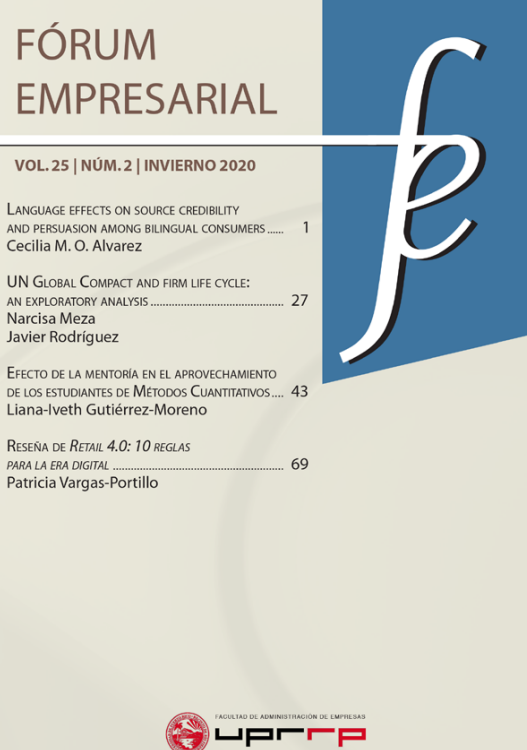Abstract
The purpose of the research is to know how mentoring influences the academic performance of Quantitative Methods students. The qualitative research was developed using the action research design in three essential phases: observe, think, and act. The participants were 22 students enrolled in Quantitative Methods during the academic year 2019-2020. The findings showed that mentoring fosters study skills for mathematics courses, identifies previous mathematical skills that need to be strengthened or developed, promotes the use of the tutoring service, and improves participation in the laboratory. Thereby, contributing to improving the academic achievement of Quantitative Methods students.
References
Aguilar Aguilar, N. L., & Manzano Soto, N. (2018). La mentoría en el nivel universitario: etapas para su implementación. Universidad y Sociedad, 10(1), 255–262. http://rus.ucf.edu.cu/index.php/rus
Álamo, M. (2010). Diseño de un programa de mentoría para promover el desarrollo de destrezas matemáticas en el estudiante de la facultad de Administración de Empresas. Cuaderno de Investigación en la Educación, 25, 51–74. http://cie.uprrp.edu/cuaderno/2016/03/30/diseno-de-un-programa-de-mentoria/
Andersen, C. L., & West, R. E. (2020). Improving mentoring in higher education in undergraduate education and exploring implications for online learning. Revista de Educación a Distancia, 20(64), Artículo 2. https://doi.org/10.6018/red.408671
Arnold, I. J., & Straten, J. T. (2012). Motivation and math skills as determinants of first-year performance in economics. The Journal of Economic Education, 43(1), 33–47. https://doi.org/10.1080/00220485.2012.636709
Birkeland, K. F., Davies, T. L., & Heard, C. A. (2019). College mentoring 101: student preferences and needs. College Student Journal, 53(3), 315–326.
Camacho Lizárraga, M. I. (2018). Mentoría en educación superior, la experiencia en un programa extracurricular. Revista Electrónica de Investigación Educativa, 20(4), 86–99. https://doi.org/10.24320/redie.2018.20.4.1999
Casado-Muñoz, R., Lezcano-Barbero, F., & Colomer-Feliu J. (2015). Diez pasos clave en el desarrollo de un programa de mentoría universitaria para estudiantes de nuevo ingreso. Revista Electrónica Educare, 19(2), 155–179. http://dx.doi.org/10.15359/ree.19-2.10
Copus, C., & McKinney, B. (2016). Early integration of tutorial support in beginning algebra. Journal of Developmental Education, 40(1), 32–34. https://eric.ed.gov/?id=EJ1152251
Cresswell, J. W. (2012). Educational research: Planning, conducting, and evaluating quantitative and qualitative research (4th ed.). Pearson Education.
Crisp, G., & Cruz, I. (2009). Mentoring college students: a critical review of the literature between 1990 and 2007. Research in Higher Education, 50(6), 525–545. https://doi.org/10.1007/s11162-009-9130-2
Deshler, J., Fuller, E., & Darrah, M. (2019). Supporting students through peer mentoring in developmental mathematics. Learning Assistance Review, 24(1), 87–112. https://eric.ed.gov/?id=EJ1214673
Dobson, L. (2013). Effective practices of formal mentoring programs. Math Alliance Research Study, 3, 1–3. https://education.illinois.edu/docs/default-source/stem-alliance-documents/Alliance_Mentoring_Brief_Final.pdf
Dolado, J. J., & Morales, E. (2009). Which factors determine academic performance of economics freshers? Some Spanish evidence. Investigaciones Económicas, 33(2), 179–210. https://www.redalyc.org/articulo.oa?id=17312886002
Dos Reis, K. M., & Yu, D. (2018). Peer mentoring: enhancing economics first years‘ academic performance. South African Journal of Higher Education, 32(6), 234–50. https://doi.org/10.20853/32-6-2979
Healy, M. A., Lancaster, J. M., Liddell, D. L., & Stewart, D. L. (2012). The role of the campus professional as a moral mentor. New Directions for Student Services, 139, 83–92. https://doi.org/10.1002/ss.20025
Hernández Sampieri, R, Fernández Collado, C., & Baptista Lu cio, P. (2010). Metodología de la investigación (5ta. ed.). McGrawHill.
Jain, R., Chaudhary, B., & Jain, N. (2016). Impact of mentoring on academic performance & career self-efficacy of business students. The Indian Journal of Industrial Relations, 51(4), 684– 693. https://www.jstor.org/stable/43974591
Kramer-Simpson, E. (2018). Moving from student to professional: industry mentors and academic internship coordinators supporting intern learning in the workplace. Journal of Technical Writing and Communication, 48(1), 81–103. https://doi.org/10.1177/0047281616646753
Laging, A., & Voßkamp, R. (2017). Determinants of maths performance of first-year business administration and economics students. International Journal of Research in Undergraduate Mathematics Education, 3(1), 108–142. https://doi.org/10.1007/s40753-016-0048-8
Luckett, K., & Luckett, T. (2009). The development of agency in first generation learners in higher education: a social realist analysis. Teaching in Higher Education, 14(5), 469-481. https://doi.org/10.1080/13562510903186618
McKernan, J. (2001). Investigación-acción y curriculum (2da. ed.). Ediciones Morata.
Morales, E. E., Ambrose-Roman, S., & Perez-Maldonado, R. (2016). Transmitting success: comprehensive peer mentoring for at-risk students in developmental math. Innovative Higher Education, 41, 212-135. https://doi.org/10.1007/s10755-015-9335-6
Muschallik, J., & Pull, K. (2016). Mentoring in higher education: does it enhance mentees‘ research productivity? Education Economics, 24(2), 210–223. https://doi.org/10.1080/09645292.2014.997676
National Mentoring Partnership. (2005). Cómo construir un programa de mentoría exitoso utilizando los elementos de la práctica efectiva. Mentor. www.mentoring.org/eeptoolkit
Okurame, D. (2012). Impact of career growth prospects and formal mentoring on organizational citizenship behavior. Leadership & Organization Development Journal, 33(1), 66–85. https://doi.org/10.1108/01437731211193124
Okurame, D. E., & Ajayi M. S. (2017). Effects of mentoring and feedback on the cognitive task performance of Nigerian undergraduate students. International Journal of Evidence Based Coaching and Mentoring, 15(2), 124–139. http://doi.org/10.24384/000254
Opstad, L. (2018). Success in business studies and mathematical background: the case of Norway. Journal of Applied Research in Higher Education, 10(3), 399–408. https://doi.org/10.1108/JARHE-11-2017-0136
Spradlin, K., & Ackerman, B. (2010). The effectiveness of computer assisted instruction in developmental mathematics. Journal of Developmental Education, 34(2), 12–14, 16, 18, 42. https://eric.ed.gov/?id=EJ986269
Stringer, E. T. (1999). Action Research (2da. ed.). Sage.
Valverde Macías, A., Ruiz de Miguel, C., García Jiménez, E., & Romero Rodríguez, S. (2004). Innovación en la orientación universitaria: la mentoría como respuesta. Contextos Educativos, 6-7, 87–112. https://doi.org/10.18172/con.530
Vega Vilca, J., Velázquez Rosado, W., & Villafañe Cepeda, W. (2016). El desempeño en los cursos cuantitativos como predictor de éxito en los estudios universitarios. Fórum Empresarial, 21(2), 79–99. https://doi.org/10.33801/fe.v21i2.8623
Velázquez Rosado, W., Villafañe Cepeda, W., & Vega Vilca, J. (2015). El efecto del laboratorio en el aprovechamiento de los estudiantes del curso Métodos Cuantitativos para Admi nistración de Empresas I. Fórum Empresarial, 20(1), 59-77. https://doi.org/10.33801/fe.v20i1.3297

This work is licensed under a Creative Commons Attribution-NonCommercial-ShareAlike 4.0 International License.
Copyright (c) 2020 Fórum Empresarial

